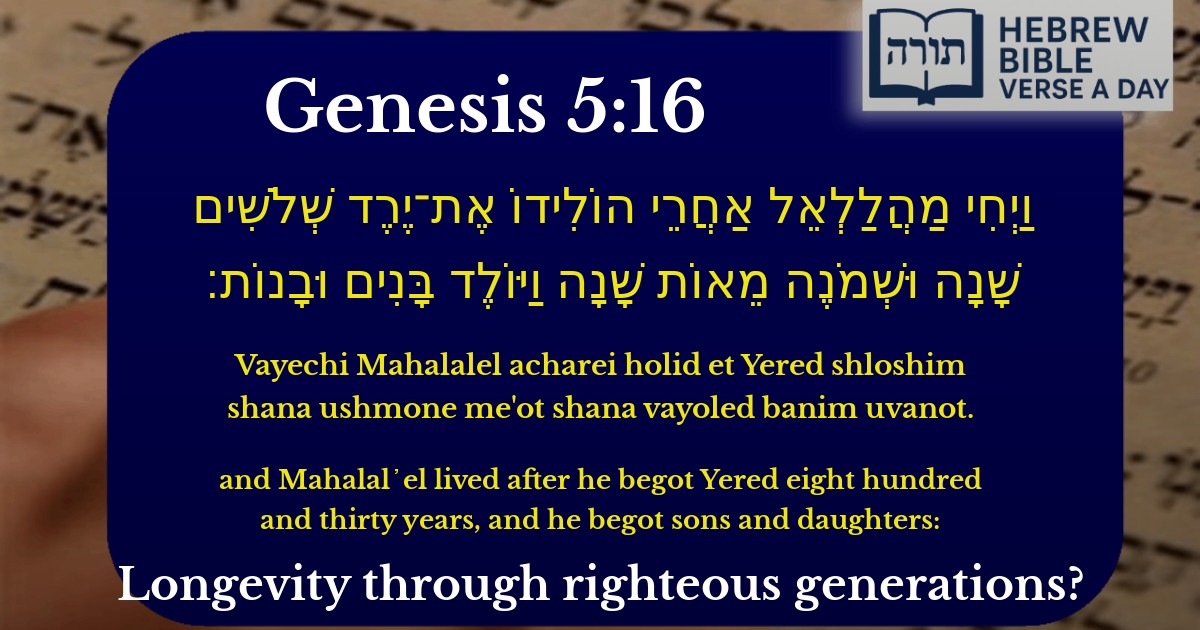Join Our Newsletter To Be Informed When New Videos Are Posted
Join the thousands of fellow Studends who rely on our videos to learn how to read the bible in Hebrew for free!
Hebrew Text
וַיְחִי מַהֲלַלְאֵל אַחֲרֵי הוֹלִידוֹ אֶת־יֶרֶד שְׁלֹשִׁים שָׁנָה וּשְׁמֹנֶה מֵאוֹת שָׁנָה וַיּוֹלֶד בָּנִים וּבָנוֹת׃
English Translation
and Mahalal᾽el lived after he begot Yered eight hundred and thirty years, and he begot sons and daughters:
Transliteration
Vayechi Mahalalel acharei holid et Yered shloshim shana ushmone me'ot shana vayoled banim uvanot.
Hebrew Leining Text
וַיְחִ֣י מַֽהֲלַלְאֵ֗ל אַֽחֲרֵי֙ הוֹלִיד֣וֹ אֶת־יֶ֔רֶד שְׁלֹשִׁ֣ים שָׁנָ֔ה וּשְׁמֹנֶ֥ה מֵא֖וֹת שָׁנָ֑ה וַיּ֥וֹלֶד בָּנִ֖ים וּבָנֽוֹת׃
וַיְחִ֣י מַֽהֲלַלְאֵ֗ל אַֽחֲרֵי֙ הוֹלִיד֣וֹ אֶת־יֶ֔רֶד שְׁלֹשִׁ֣ים שָׁנָ֔ה וּשְׁמֹנֶ֥ה מֵא֖וֹת שָׁנָ֑ה וַיּ֥וֹלֶד בָּנִ֖ים וּבָנֽוֹת׃
🎵 Listen to leining
Parasha Commentary
📚 Talmud Citations
This verse is not quoted in the Talmud.


Overview of the Verse
The verse (Bereishit 5:16) describes the lifespan of Mahalalel after the birth of his son Yered, stating that he lived an additional 830 years and had more children. This is part of the genealogical list in Perek Heh (Chapter 5) of Sefer Bereishit, which traces the lineage from Adam to Noach.
Rashi's Commentary
Rashi (Bereishit 5:16) notes that the Torah emphasizes Mahalalel's lifespan "after he begot Yered" to teach that the years following the birth of a righteous child are considered meaningful. Yered was the ancestor of Chanoch, who "walked with G-d" (Bereishit 5:22), indicating that Mahalalel merited long life due to his righteous descendants.
Rambam's Perspective
Rambam (Moreh Nevuchim 2:47) discusses the extended lifespans of the early generations as symbolic of their spiritual completeness. Mahalalel's longevity reflects his role in transmitting Torah and ethical teachings to future generations, ensuring the continuity of divine wisdom.
Midrashic Insights
The Midrash (Bereishit Rabbah 23:4) connects Mahalalel's name—meaning "the praise of G-d"—to his righteous character. His additional years were a reward for raising children who upheld divine service, reinforcing the principle that "the righteous are remembered for their offspring" (Mishlei 10:7).
Significance in the Genealogy